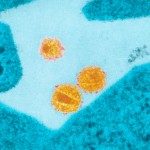Link to Pubmed [PMID] – 16978874
Semin. Immunol. 2006 Dec;18(6):387-403
Susceptibility to HIV infection and AIDS progression is variable among individuals and populations, and in part genetically determined. Genetic variants of genes encoding HIV co-receptors and their chemokine ligands have been described, and some of these variants were associated with resistance to HIV infection and/or disease progression. We review here the reported data regarding the variants of the CCR5, CCR2, CX3CR1, MIP-1alpha/CCL3, MIP-1beta/CCL4, RANTES/CCL5 and SDF-1/CXCL12 genes. The Delta32 deletion mutant of CCR5, resulting in a non-functional receptor not reaching the cell surface, is unambiguously associated with strong, although incomplete, resistance to HIV infection for homozygotes, and retarded progression for heterozygotes. Specific haplotypes encompassing the CCR5 and CCR2 loci, and the copy number of the CCL3L1 gene, have also been convincingly correlated with delayed progression. For other gene variants, involving CXCL12/SDF-1 and CX3CR1, conclusive evidence for their relevance in the frame of HIV susceptibility is still lacking.

